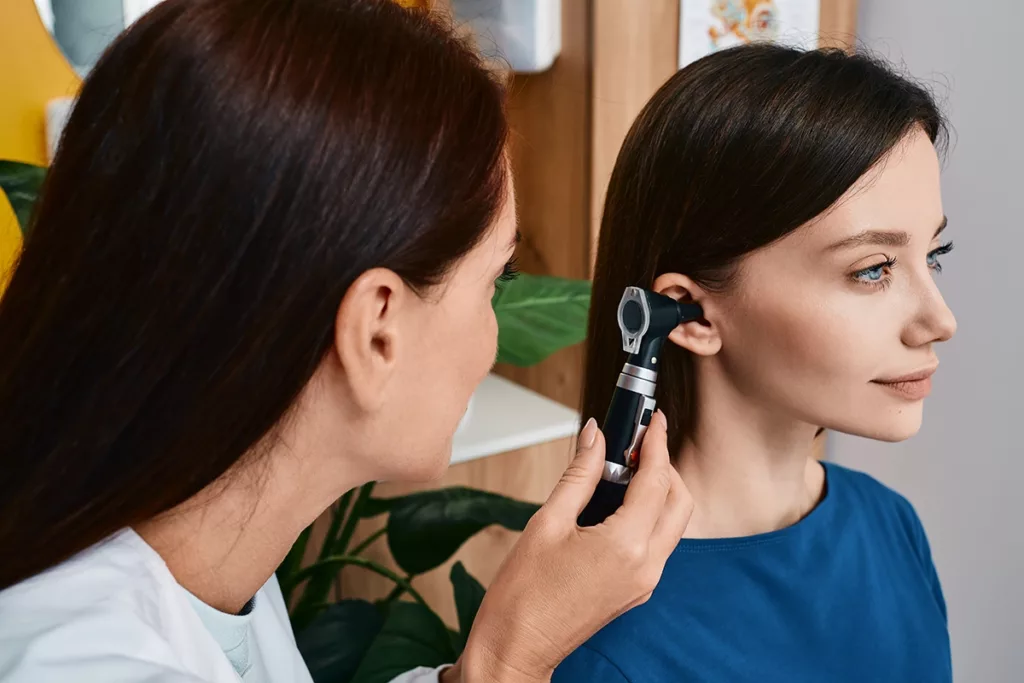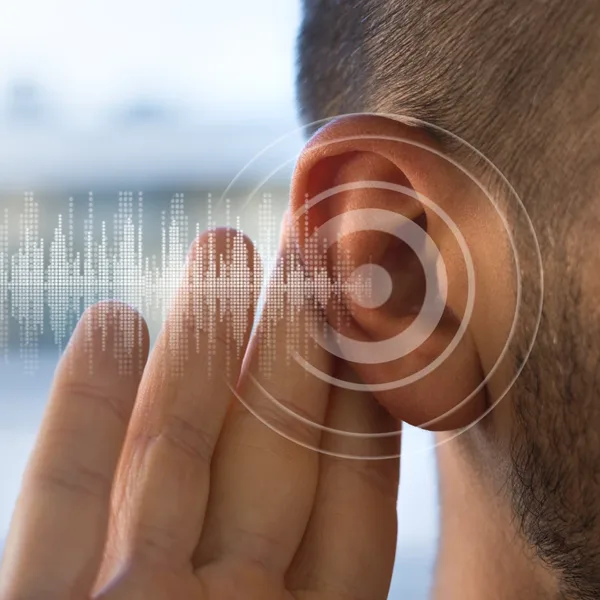
Did you know that an estimated 48 million people in the United States have some degree of hearing loss? The incredibly common condition can be caused by a variety of things, including age, noise exposure, and even certain medical conditions. However, the early symptoms of hearing loss can be so subtle that many individuals remain unaware of the condition until their loss becomes severe. This combination of the gradual progression of hearing loss and its high prevalence underscores the importance of routine hearing tests for adults. Regular exams are not only key to detecting hearing loss early on but can also prevent further progression which makes all the difference in maintaining a healthy quality of life.
In this article, we look at the prevalence of hearing loss in adults and outline the benefits of regular hearing tests for your overall health and well-being. We will also explain the importance of early hearing loss detection, and how often you should have your hearing tested.
The Prevalence of Hearing Loss in Adults
Hearing loss is a widespread condition, affecting a large segment of the adult population worldwide. According to the National Institute on Deafness and Other Communication Disorders (NIDCD), approximately 15% of adults in the U.S. aged 18 and over report having some degree of hearing loss. The NIDCD also states that among adults aged 20-69, age is the strongest predictor of hearing loss, with the greatest number of people with the condition being between the ages of 60-69. The table below details the percentage of the adult population in the United States who have disabling hearing loss according to NIDCD reporting:
| Age Group | Population with Disabling Hearing Loss (%) |
|---|---|
| 45 – 54 | 2% |
| 55 – 64 | 8.5% |
| 65 – 74 | 25% |
| 75+ | 50% |
The Benefits of Routine Hearing Tests for Adults

A hearing test is a non-invasive procedure that involves a series of evaluations to measure your hearing ability and identify any potential issues. These comprehensive tests are conducted by trained professionals and are designed to evaluate various aspects of hearing function. During a test, you will be instructed to wear headphones and respond to different sounds, usually in the form of tones and spoken words. The results of the test are then plotted on an audiogram, which is a visual representation of your hearing ability across different frequencies. In addition to determining the current state of your hearing, routine hearing tests have a number of benefits for adults, many of which we review below.
Early Hearing Loss Detection
One of the most significant benefits of hearing tests is their ability to aid in early detection of hearing loss. As hearing loss tends to develop gradually, it can be challenging for people to notice the subtle changes in their hearing ability. There are various types and causes of hearing loss, but in all cases, the earlier the condition is diagnosed the sooner you can get the care and treatment you deserve. Routine hearing tests can catch these early signs, allowing for timely treatment and management. By addressing hearing loss in its initial stages, you can prevent further deterioration of your ability to understand speech and minimize the impact of the condition on your daily life.
Establish a Baseline of Your Hearing
Beyond diagnosing existing hearing loss, hearing tests also play a critical role in hearing loss prevention. Having a hearing test done before any symptoms have started or any hearing loss has occurred will provide you with a hearing health baseline. This baseline test will ensure even the smallest and most gradual changes in your hearing are identified sooner, and treatment can be implemented as soon as possible. Regular screenings also allow specialists to identify early signs of hearing damage, especially if you are exposed to high levels of noise at work or during recreational activities. By identifying potential risks, preventive measures can be implemented to safeguard your hearing and prevent further damage.
Identifying Other Hearing Related Problems
Hearing tests can also reveal other hearing-related issues such as conditions like tinnitus (ringing in the ears) or auditory processing disorders, which can significantly affect your ability to comprehend speech and sounds.
Identifying the Type and Degree of Hearing Loss
If loss or damage is detected, your specialist will also be able to determine the type of hearing loss and the severity of the condition during your exam. There are different types of hearing loss, including sensorineural, conductive, and mixed, each requiring distinct treatment approaches. Additionally, hearing tests measure the degree of hearing loss, ranging from mild to profound, which greatly impacts the care and treatment requirements for patients.
Custom Hearing Loss Treatments
After an accurate diagnosis of hearing loss has been made, your specialist will work closely with you to develop a treatment plan specific to your unique needs. The best hearing aids for you will depend on a number of factors including your type and degree of hearing loss, your lifestyle, aesthetic concerns, required features, and more. This treatment plan will be optimized to not only treat your hearing loss but also aid in ensuring your quality of life for years to come.
Ongoing Hearing Health Care
Hearing tests are not one-time events; they are part of an ongoing process to monitor your hearing health over time. As you age or encounter changes in your environment, follow-up hearing tests are essential to ensuring that your hearing solutions remain effective and appropriate.
The Importance of Addressing Hearing Loss Early

Despite its prevalence, hearing loss is frequently undertreated. Subtle changes in hearing can often be dismissed as natural consequences of aging, leading many to overlook the need for care. Unfortunately, failing to address hearing loss in its early stages can lead to a host of adverse consequences. For instance, people with hearing loss often experience communication difficulties with people in both their personal and professional lives. This can contribute to feelings of isolation, depression, social withdrawal, fears of career inadequacies, and more. On top of that, untreated hearing loss has also been associated with an increased risk of cognitive decline in older adults and conditions such as dementia.
Early detection and intervention play a crucial role in mitigating the impact of hearing loss on your quality of life. Routine hearing tests can identify subtle changes in hearing ability, allowing for timely treatment. These interventions can significantly enhance your ability to engage in conversations, enjoy social interactions, and remain active and independent in your day-to-day life.
Recommended Hearing Test Frequency for Adults
The frequency of hearing tests can vary depending on various factors, including age, overall health, and exposure to potential risk factors for hearing loss like loud noises. However, understanding the recommended timelines for hearing evaluations can help you take control of your hearing health and seek timely intervention when needed.
For most adults, it is advisable to have a baseline hearing test between the age of 18-25, even if you have no apparent hearing concerns. This initial evaluation can serve as a reference point for future tests and help detect any early signs of hearing loss. After establishing a baseline, it is generally recommended to undergo hearing tests every three to five years until around the age of 50. Whether or not you are experiencing symptoms, people 60 years of age and older are advised to have annual hearing exams. Similarly, in scenarios where noise-induced hearing loss (NIHL) is a concern, it is highly advised that you attend yearly hearing tests as well, regardless of age.
Schedule Your Hearing Test Today to Safeguard Your Hearing
Routine hearing tests for adults are important for several reasons, including early hearing loss detection, identifying other potential hearing-relation conditions, and receiving the personalized care that you deserve. Early detection of hearing loss plays a crucial role in mitigating the impact of this condition on your everyday life, making routine exams extremely important to your quality of life and your independence.
We encourage you to take the first step to preserving your hearing for years to come by visiting any of our hearing clinics conveniently located throughout the United States. Don’t wait until it’s too late – take control of your hearing health by scheduling an exam today.







Have a question or Comment?